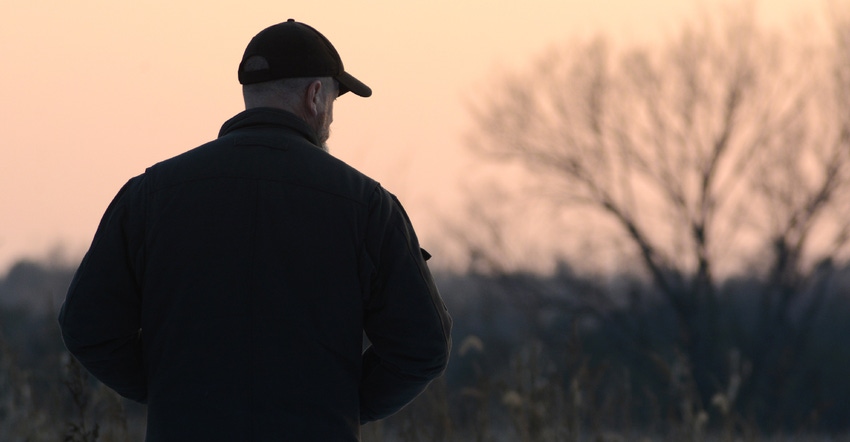
The death of a loved one sets each living person on their own grief journey.
Yet the death of a beloved one by suicide, especially when you live in a rural area, can be a lonely walk and present additional challenges.
Dan Reidenberg, an internationally known expert on suicide prevention and executive director of Suicide Awareness Voices of Education (SAVE), offered insight on suicide bereavement through a webinar Dec. 1 hosted by the Minnesota Departments of Agriculture and Health. SAVE, based in Bloomington, Minn., works to prevent suicide through public awareness and education, reduce the stigma of suicide and serve as a resource to people touched by suicide.
“It’s important to talk about the bereavement side of suicide loss,” Reidenberg said. From 2014 to 2018, more than 450 farmers died by suicide across nine Midwest states. Survivors of suicide are the largest mental health casualty in these events, he added. Research has shown that each death by suicide impacts 147 people. Or put another way, in 2018, one in every 61 Americans was a survivor of suicide loss.
Reidenberg said those in suicide bereavement experience higher levels of rejection, blame, shame, stigma and the need for concealing the cause of death. For those who live on farms and in rural communities, those feelings may be amplified due to lack of access to support groups or therapists.
Rural people are often known for rushing to help neighbors when disasters occur, such a barn fire or grain entrapment. But not so with suicide. They do not know how to respond or what to say.
“People may not offer support,” he said. “That is magnified in a rural community, to hide how someone died.”
The shock of suicide raises questions that do not get answered. Statistics show that rural people who die by suicide are usually physically healthy, they often die at home or near the farm, and they are often discovered by family.
Having the suicide take place on the farm is traumatic for the family, as they occupy the same space where the death of their loved one occurred.
“You can’t get away from it, because it is your home and also your business,” Reidenberg noted.
As for cause, firearms in the home account for 51% of suicide deaths, followed by overdosing on pills. Regardless of how it happened, some survivors choose to explain the death another way.
“Often people will try to cover it up,” Reidenberg said. “They will say it was an accident. ‘He accidentally pulled the trigger while cleaning his gun’ or ‘He fell.’ It is shocking to see, and it has a lifelong impact on survivors.”
Another challenge faced by rural survivors is that everyone knows you and knows what happened. In the city, there can be anonymity, allowing you to get away from it. In the country, you can’t.
How to help
With the array of emotions that those in suicide bereavement feel, Reidenberg said there is the tendency to want to fix things for them. That is not helpful. Instead, be there for them. He suggests:
• Acknowledge their grief. Offer words of consolation such as “I’m sorry,” and/or “I am hurting for you.” Offer support beyond the first year after the suicide. In the U.S., people often think it’s the first year after loss that is the hardest and that after that, it’s time for survivors to move along. Not so. Those who have been on grief journeys report that years two and three are the hardest.
• Know that the suicide grieving process does not end. Time does not heal. Rather, time passes and changes the wound.
• Do not make insensitive statements. These include “You’re young, you can remarry,” “They are better off now” and others.
• Educate yourself about suicide and the science behind it. Familiarize yourself with community support, groups and therapists (see below).
• Recognize that the grieving process is complex and each person grieves differently. No one follows a specific order in the textbook stages of grief, which include denial and anger. Be OK with the process and assure them it is normal.
* Most important is to be there and to listen. Don’t try to fix them.
* Don’t judge or blame the person who died. This helps no one.
* Be OK with not knowing why or how the person died by suicide. As survivors struggle to answer that, reassure them it’s OK for them and you not to know, and instead, grieve.
And during the pandemic, Reidenberg said it is even more important to be intentional.
“We do have to do more and reach out more,” he said. “Everyone is tapped out emotionally. We need to ensure that suicide death is not overshadowed by COVID. We need to give grief time.”
MDA and MDH recorded the presentation and will replay it from 3 to 4:30 p.m. Dec .14. You must register to listen. Contact Meg Moynihan at MDA to do so at [email protected].
For more information on SAVE, visit save.org.
Resources for mental health emergencies
• National Suicide Prevention Lifeline (24/7)
1-800-273-TALK (8255)
TTY: 1-800-799-4TTY (4889)
Press "1" for veterans
• Spanish Language National Suicide Prevention Lifeline
1-888-628-9454
• Crisis Text Line
Text MN to 741741
• Minnesota Farm & Rural Helpline
833-600-2670
State and local mobile crisis lines
In the Twin Cities metro area, call:
• **CRISIS (274747)
Outside of the Twin Cities metro area, visit:
• Children's Local Mobile Crisis
• Adult Local Mobile Crisis
Looking for a rural bereavement suicide support group?
An online support group facilitated by Monica McConkey, Minnesota Rural Mental Health specialist, meets from 8 to 9:30 p.m. the third Monday of each month via Zoom. The meeting is open to Minnesota farming and ranching adults grieving those who died by suicide.
Contact McConkey for more information at [email protected] or 218-280-7785.
About the Author(s)
You May Also Like






